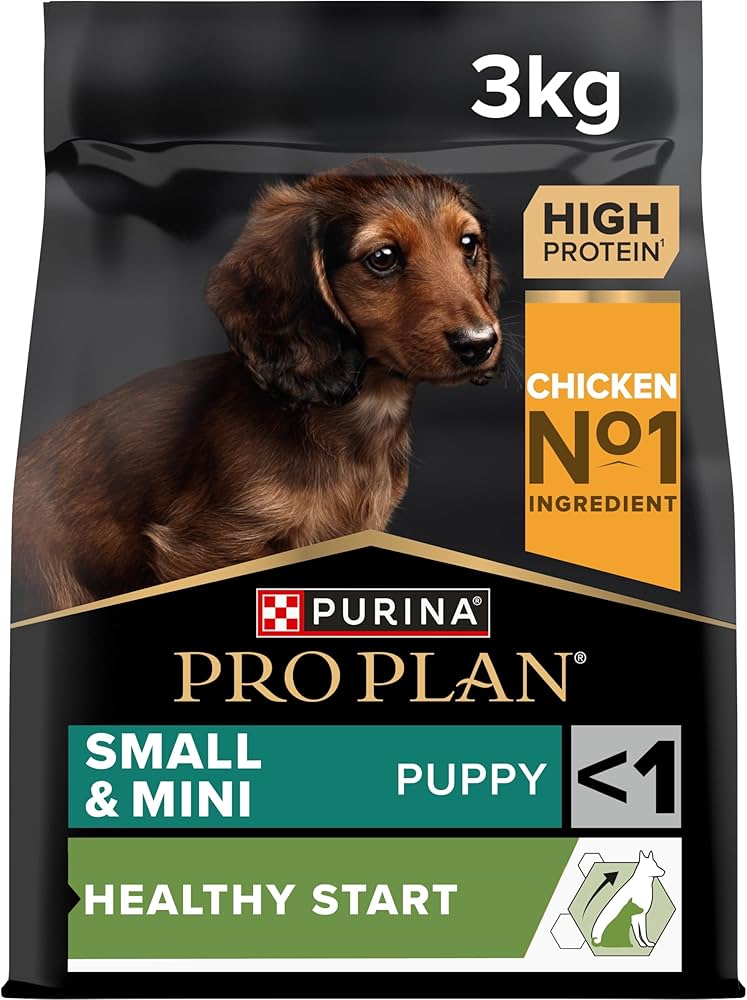Welcoming a new puppy into your home is an exciting time, and providing them with the right nutrition is paramount for their healthy development. Purina Pro Plan Small & Mini Puppy dry dog food, featuring chicken as the primary ingredient, is specifically formulated to meet the unique dietary needs of small and mini breed puppies during their crucial growth stages. This detailed guide will explore the benefits and key features of this specialized puppy food, helping you make an informed decision for your furry friend’s well-being.
Understanding Puppy Nutritional Needs
Puppies, especially those of small and mini breeds, have higher energy and nutrient requirements compared to adult dogs. They need a balanced diet rich in protein for muscle development, calcium and phosphorus for strong bones and teeth, and essential fatty acids for healthy skin and a shiny coat. Their digestive systems are also still developing, making them more sensitive to certain ingredients. Purina Pro Plan aims to address these specific needs with its carefully crafted formula.
Key Features and Benefits of Purina Pro Plan Small & Mini Puppy Food with Chicken
This puppy food is designed with small breed puppies in mind, offering several distinct advantages:
High-Quality Protein for Lean Muscle Development
The primary ingredient in this formula is real chicken, which provides a high-quality source of protein essential for building lean muscle mass. This is particularly important for active small breed puppies who need strength and stamina as they grow and explore their world. The protein content supports overall growth and development without contributing to excessive weight gain.
Optimal Nutrient Balance for Growth
Purina Pro Plan Small & Mini Puppy food is formulated to deliver an optimal balance of essential vitamins and minerals. This includes:
- Calcium and Phosphorus: Crucial for the development of strong bones and healthy teeth. The right ratio of these minerals is vital to prevent skeletal issues.
- DHA (Docosahexaenoic Acid): An omega-3 fatty acid that plays a critical role in brain development and vision. This is often sourced from fish oil, ensuring your puppy’s cognitive functions develop optimally.
- Antioxidants: A blend of vitamins E and C, along with other antioxidants, helps support a strong immune system, protecting your puppy from common illnesses as they build their defenses.
Smaller Kibble Size for Easy Digestion and Palatability
Small breed puppies have smaller mouths and digestive tracts, making it difficult for them to chew and digest larger kibble. Purina Pro Plan addresses this by offering smaller kibble pieces that are easier for them to manage. This not only prevents choking hazards but also enhances palatability, ensuring your puppy enjoys their meal and consumes the necessary nutrients. The smaller kibble size also promotes better nutrient absorption.
Digestive Health Support
This formula often includes prebiotics, which are beneficial fibers that nourish the good bacteria in your puppy’s gut. A healthy gut microbiome is essential for efficient digestion, nutrient absorption, and a robust immune system. This can help reduce common puppy digestive issues like loose stools or gas.
Shiny Coat and Healthy Skin
The inclusion of omega-6 fatty acids, typically from sources like sunflower oil, works in synergy with omega-3 fatty acids to promote healthy skin and a lustrous coat. A healthy skin barrier is the first line of defense against environmental irritants and infections, while a shiny coat is often an indicator of overall good health.
Feeding Guidelines and Recommendations
The specific feeding amounts will vary based on your puppy’s age, weight, and activity level. It is crucial to follow the guidelines on the product packaging and consult your veterinarian to determine the appropriate portion sizes.
- Transitioning to New Food: When introducing Purina Pro Plan Small & Mini Puppy food, do so gradually over a period of 7-10 days. Mix increasing amounts of the new food with decreasing amounts of the old food to avoid digestive upset.
- Monitoring Puppy’s Condition: Regularly monitor your puppy’s body condition. You should be able to feel their ribs easily but not see them. Adjust feeding amounts as needed to maintain a healthy weight.
- Fresh Water: Always ensure that fresh, clean water is available for your puppy at all times.
Why Choose Purina Pro Plan for Your Small Breed Puppy?
Purina Pro Plan is a brand trusted by veterinarians and pet owners for its commitment to scientific research and quality ingredients. The Small & Mini Puppy formula with chicken is a testament to this dedication, offering a complete and balanced diet tailored to the specific needs of growing small breed dogs. By choosing this food, you are investing in your puppy’s long-term health, providing them with the foundational nutrition they need to thrive and grow into a happy, healthy adult dog.
In conclusion, Purina Pro Plan Small & Mini Puppy dry dog food with chicken offers a scientifically formulated solution for the nutritional demands of young, small-breed dogs. Its focus on high-quality protein, essential nutrients, digestive health, and appropriate kibble size makes it an excellent choice for ensuring your puppy gets the best start in life. Always consult with your veterinarian to personalize your puppy’s diet and healthcare plan.

